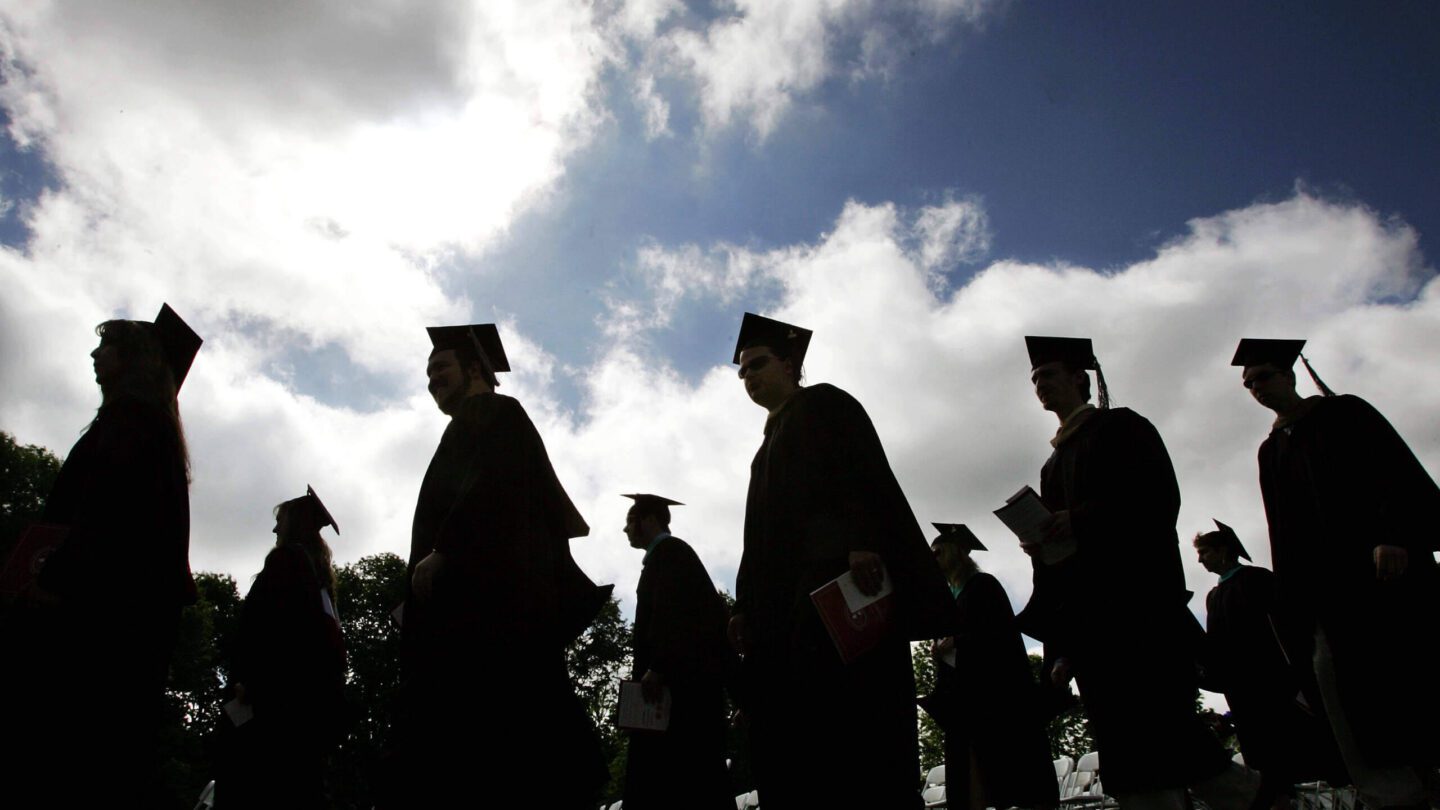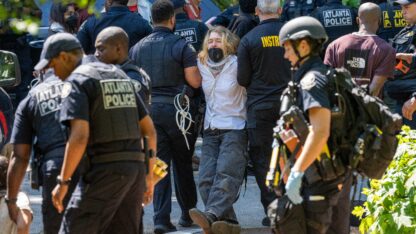Graduation ceremonies at a handful of universities across the country faced light disruptions over the weekend, as pro-Palestinian demonstrators staged walkouts, chants, and waved Palestinian flags during commencement speeches.
At UC Berkeley, dozens of graduates stood up from their seats inside Memorial Stadium Saturday morning with signs reading “Divest” – a call for universities to get rid of their investments in companies that have investments in Israel because of the war in Gaza. At the University of Wisconsin-Madison, a small group of students carrying a Palestinian flag staged a silent protest at Camp Randall Stadium. At the University of North Carolina, Chapel Hill, pro-Palestinian demonstrators splashed red paint on the steps of a building hours before the commencement ceremony.
The protests come as administrators at universities from California to New York have struggled to find the right balance in responding to the pro-Palestinian encampments that have sprung up in recent weeks. Schools including Columbia University, the University of Pennsylvania and the Massachusetts Institute of Technology have been under scrutiny for calling in police to dismantle the encampments and arresting students who refused to disperse.
Other schools, including Northwestern and Brown, have reached agreements with students to take at least some of their demands into consideration. The latest agreement came Sunday, when student protestors at Johns Hopkins University agreed to take down their encampment – which began on April 29 – after the university promised to review students’ demand for the university to divest from companies with ties to Israel.
At Saturday’s university-wide commencement ceremony, UC Berkeley’s Chancellor Carol Christ began the event by acknowledging the student protestors.
“They feel passionately about the brutality of the violence in Gaza,” Christ told the crowd, adding “I, too, am deeply troubled by the terrible tragedy.”
Israel is now in the eighth month of its military offensive inside Gaza, an operation it launched in response to the Oct. 7 surprise attack by Hamas-led militants. More than 1,200 people were killed in the attack, while more than 200 others were taken hostage, according to Israeli officials.
According to the Gaza Health Ministry, more than 34,000 Palestinians have been killed in Israel’s response and some 78,000 wounded.
As speeches continued at Berkeley, a group of some 500 people ignored warnings from an administration official and gathered in an empty section of the stadium where they sang chants calling for the university to divest from Israel.
“This wouldn’t be Berkeley without a protest,” said the student body president, Sydney Roberts, as her speech was disrupted by demonstrators’ chants.
While students at UC Berkeley have been amongst the most vocal in their calls for the university to cut ties with Israel, recent protests have also been met with accusations of antisemitism from members of the campus’s Jewish community.
Known for being the birthplace of the free speech movement of the 1960s, the university has been dealing with two federal investigations relating to charges of antisemitism since the Oct. 7 attack — one from the Department of Education, the other by Republicans in Congress.
Some protests went beyond the war in Gaza
Dozens of students at Virginia Commonwealth University in Richmond staged a silent walkout during Saturday’s graduation ceremony to protest the commencement address from Republican Virginia Governor Glenn Youngkin.
The university’s chapter of the NAACP had previously criticized the school’s decision to invite Youngkin over his efforts to unravel a series of policies which have promoted diversity, equity and inclusion (DEI).
“Since becoming Governor of Virginia, Youngkin has worked to intimidate and silence educators with anti-racist pedagogies,” the group wrote in a letter sent to the university president Michael Rao and the board of visitors last week, urging them to rescind Youngkin’s invitation to speak.
The letter cited a now defunct tip line the governor briefly put in place where parents could report faculty who were teaching “divisive concepts” in schools as well as unraveling legislation which rights groups argued protected transgender youth.
Youngkin has defended his criticism of DEI policies, previously stating he believes they result in lowered standards in the name of “equity.”
All eyes on Biden’s upcoming commencement address
The recent disruptions come just a week before President Joe Biden is scheduled to deliver the commencement address at Morehouse College in Atlanta.
The university has faced criticism by those who are against Biden’s handling of the conflict in Gaza and his more recent comments about student protestors — in which he said some of them used “violent” methods.
A group of faculty members will vote this week about whether or not to award Biden an honorary degree during the ceremony.
In an interview with NPR’s Weekend Edition Sunday, Morehouse College President David A. Thomas said he was “fully in support” of Biden coming to speak at the university.
“The nation needs somewhere that can visualize for us the ability to hold the tensions that in so many ways are threatening to divide our society, that have divided some of the most venerable campuses in the country,” Thomas said, adding “that’s what Morehouse was born for.”
Copyright 2024 NPR. To see more, visit https://www.npr.org.
9(MDAxODM0MDY4MDEyMTY4NDA3MzI3YjkzMw004))

9(MDAxODM0MDY4MDEyMTY4NDA3MzI3YjkzMw004))








